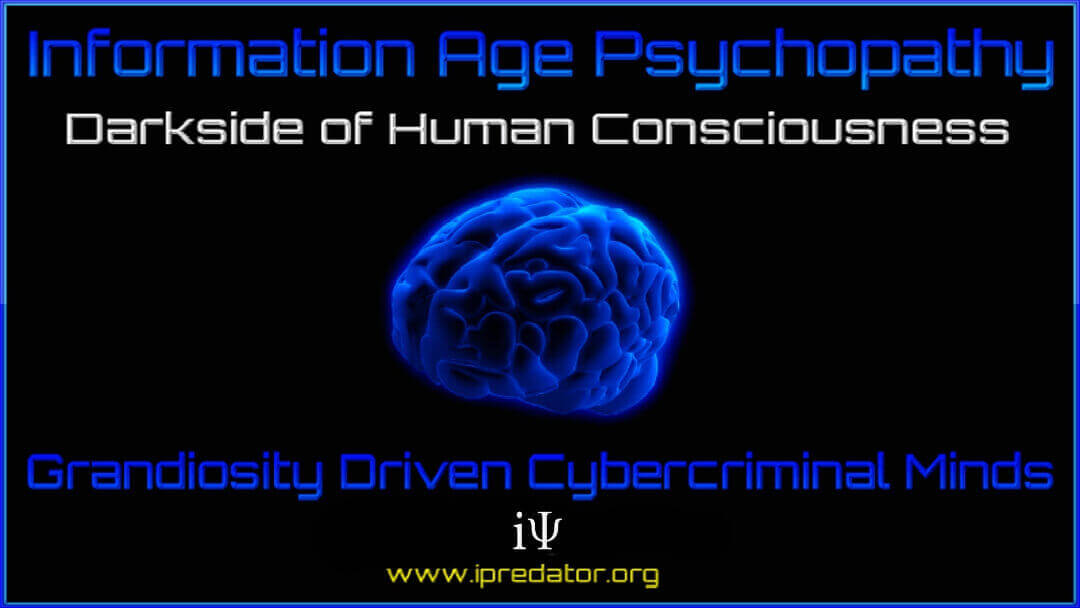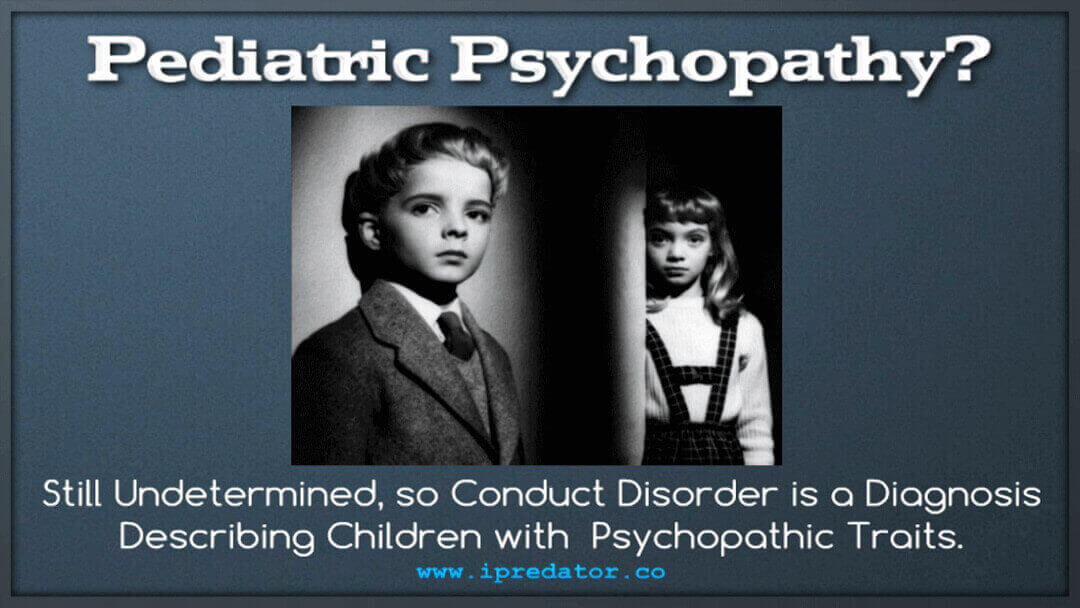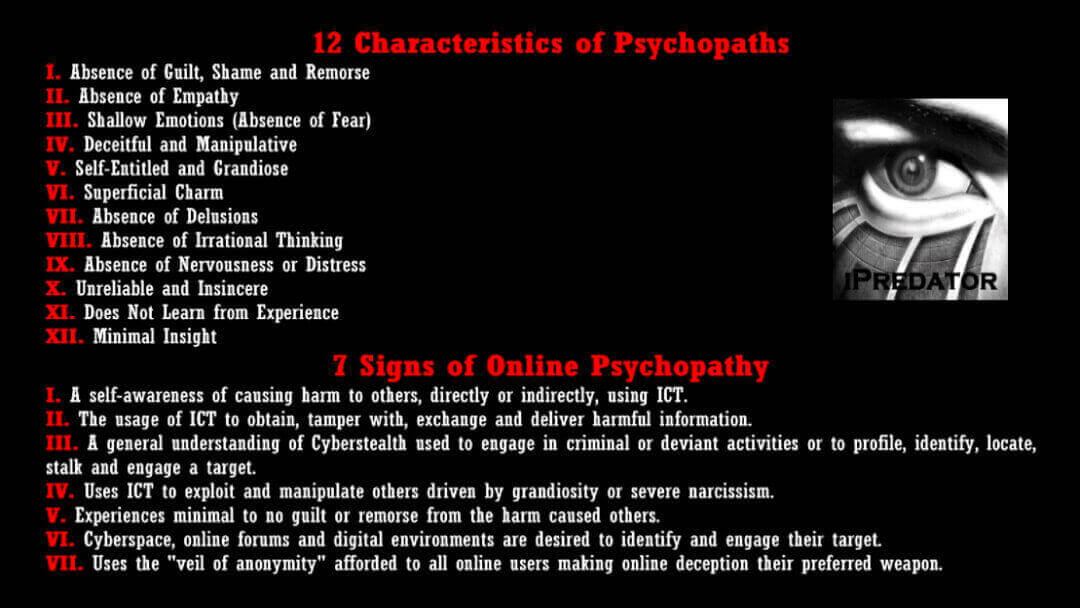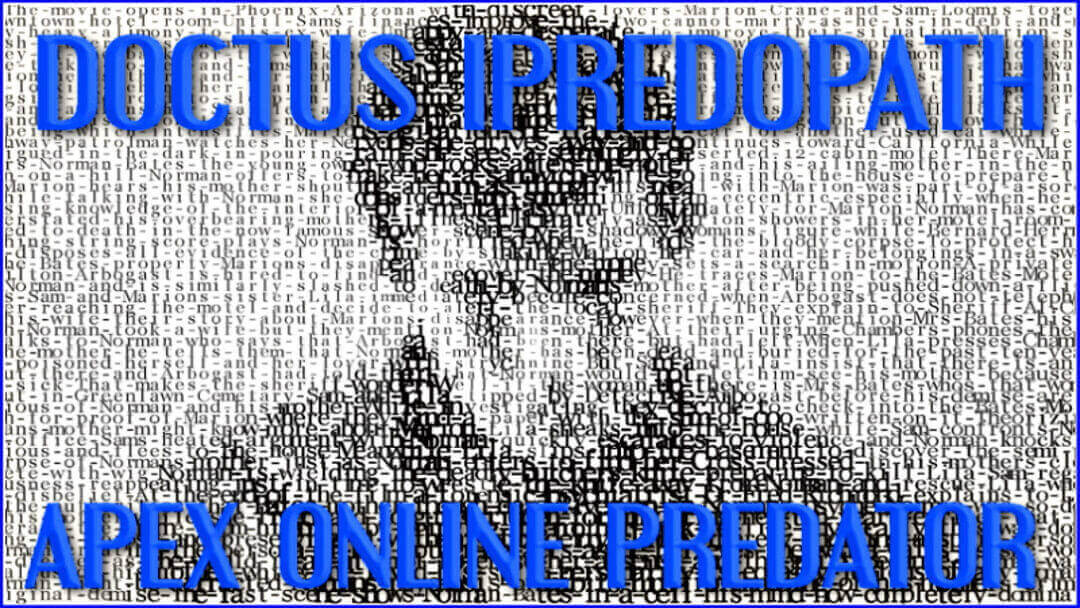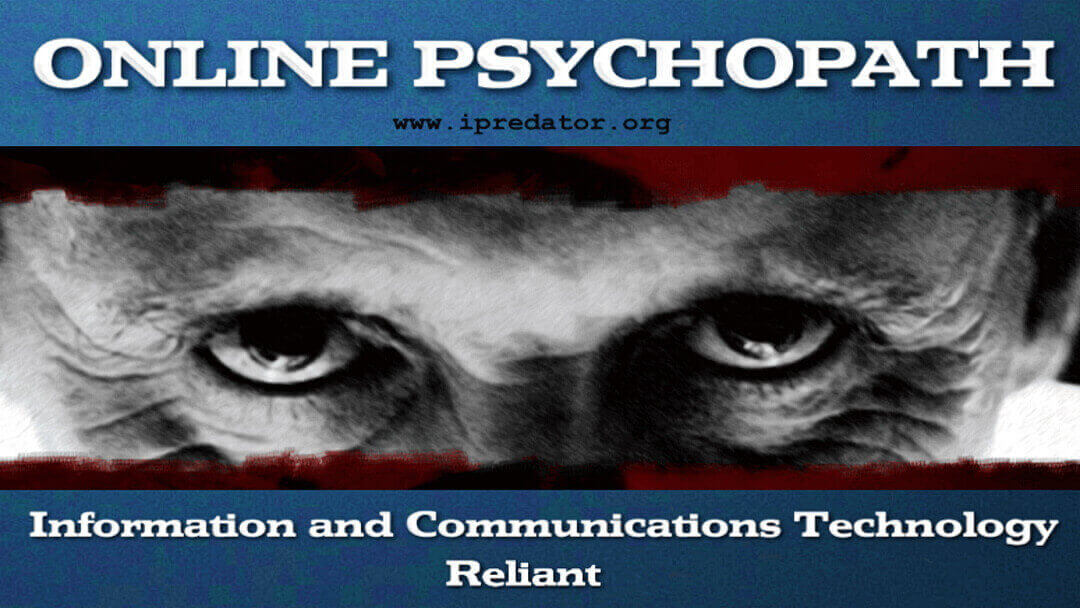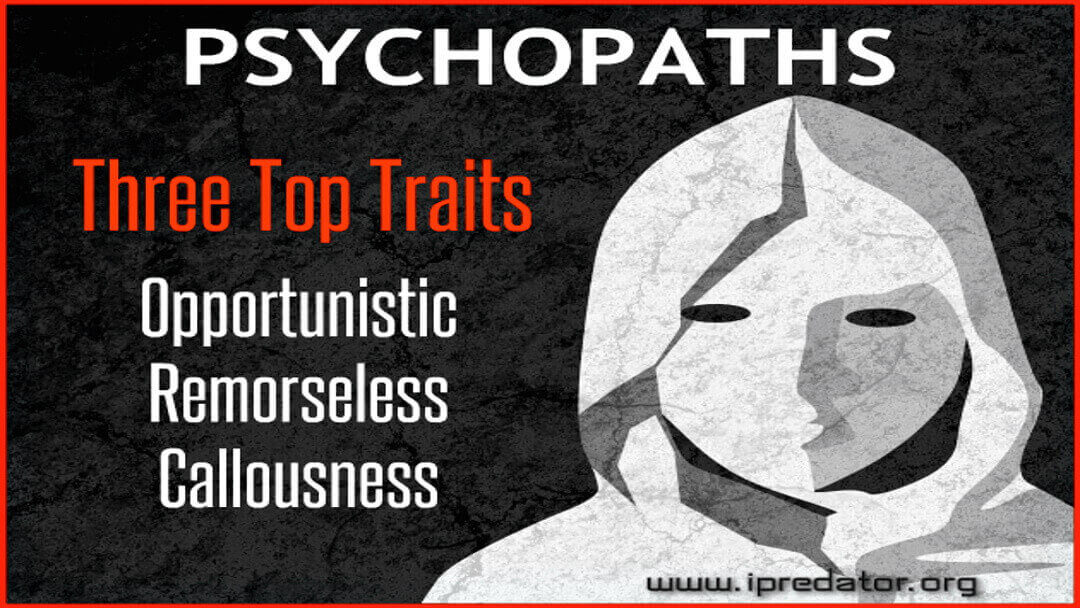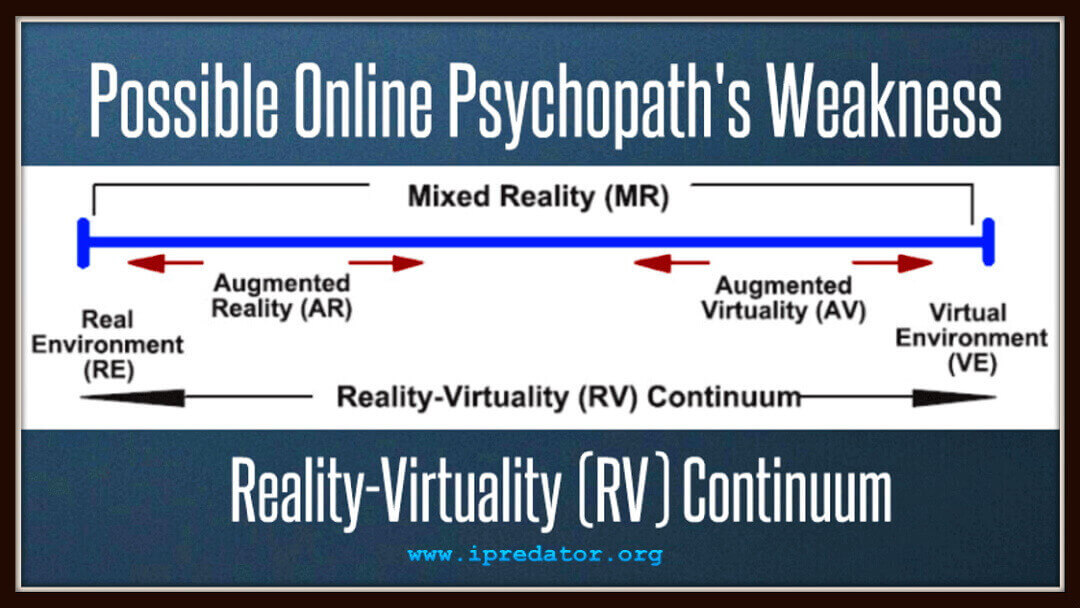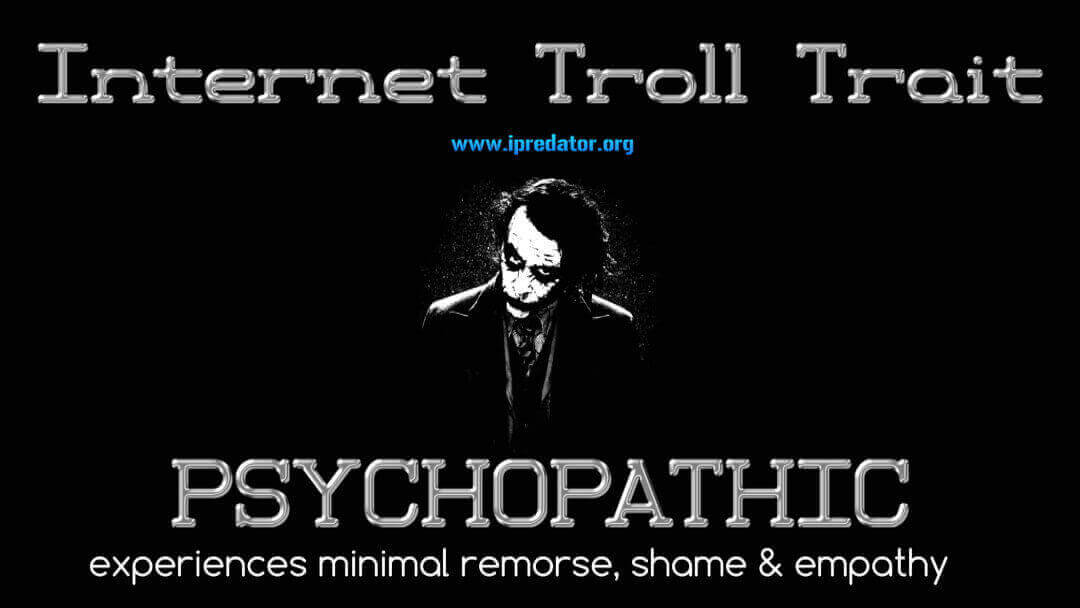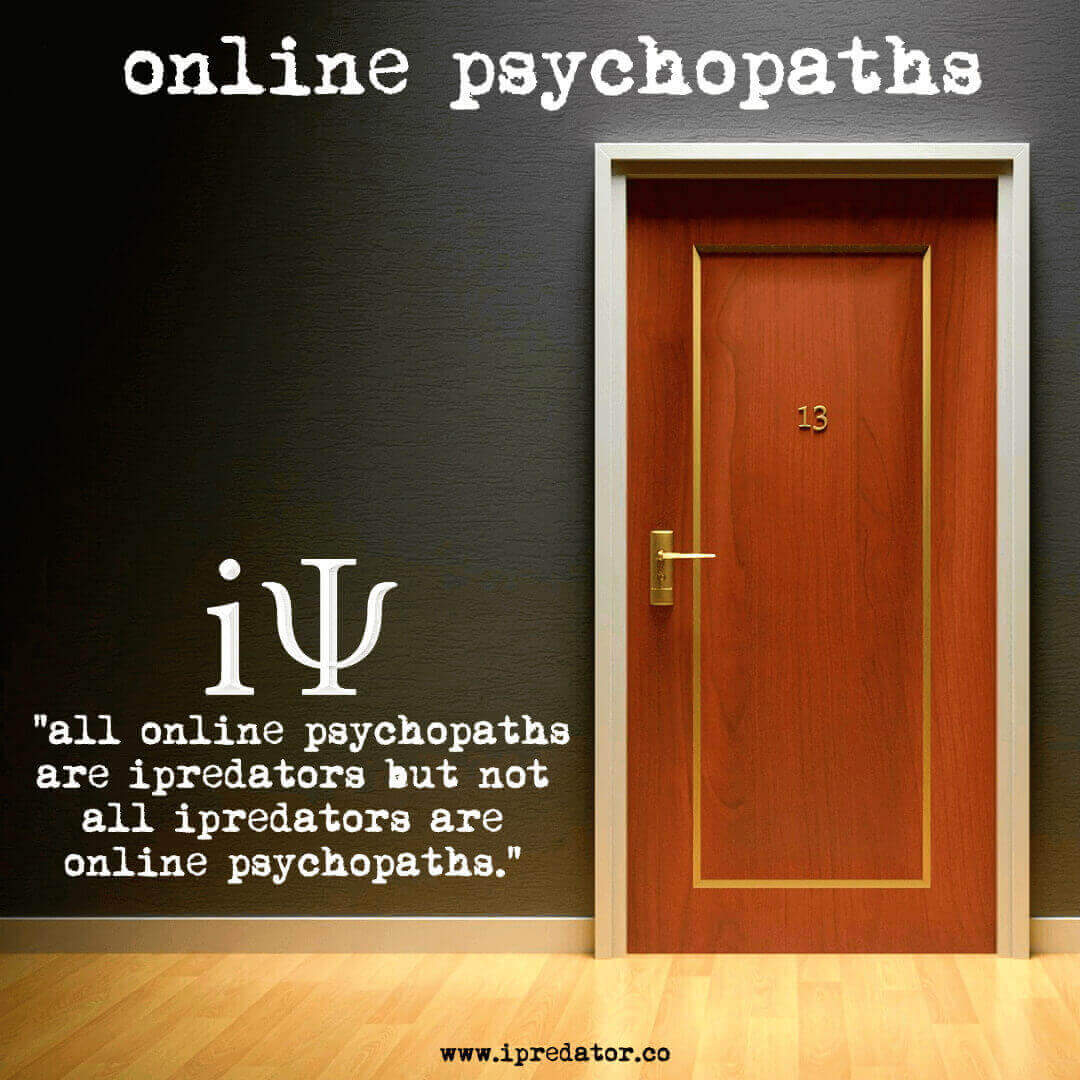25 Free Online Psychopath Images
by
Michael Nuccitelli, Psy.D.
Part 1: Provided below are 25 free online psychopath educational images created by this writer, Michael Nuccitelli, Psy.D. They are JPEG files and either 1080×1080, 1080×1350 or 1080×608 pixels. These images are optimal for Instagram or can be edited to different sizes. Dr. Nuccitelli’s images are available for direct download, free and public domain. Edit them as you wish and no attribution to this writer is required. To download, simply right click the image and “save as” or from your context menu. Over the next 3-4 months, Dr. Nuccitelli will be publishing many more blog posts making all his iPredator themed images available to download. Lastly, pasted below are links to his 26 free online safety themed checklists and inventories.
Online Psychopath [aka, iPredopaths]
Online Psychopath [aka, iPredopaths]: iPredopathy is an Information Age criminology and human consciousness concept replacing the pre-Information Age profiles of sociopathy and psychopathy. iPredopathy is an advanced stage personality disorder describing any adolescent to adult male or female who skillfully uses Information and Communications Technology [ICT] to troll, harm, control and manipulate their human targets.
Driven by grandiosity, sexual perversion or perceptual distortion, iPredopaths experience minimal to no remorse or shame for the harm they cause others. Just as iPredators, many iPredopaths do not break the law and live unscathed by law enforcement, fraternal organizations, religious institutions and the legal system. Using cyberspace [aka, Internet, Darknet, Usenet] and electronic devices, online psychopaths design and implement their criminal, deviant, violent, deceptive and cyberstalking tactics.
Their human quarries are unsuspecting, vulnerable, submissive and internet safety ignorant children, older adults, unprepared businesses and psychologically distressed adults. Unlike the psychologically dysfunctional, developmentally immature and minimal to moderate anti-social personality disordered iPredator, iPredopaths do not experience guilt, remorse, shame or fear before, during or after their offline and online conquests and/or manipulative interpersonal dynamic strategies.
In addition to being devoid of remorse and shame, iPredopaths are extremely grandiose, habitually deceptive and highly dependent upon ICT to fuel, define and justify their dissociative perceptual fantasies. iPredopaths are similar in core beliefs to pre-Information Age psychopaths, but differ in behavioral signatures, stalking methodologies, choice of hunting environments, and psychodynamic faculties.
Online Psychopath Signs
- A self-awareness of causing harm to others, directly or indirectly, using Information and Communications Technology (ICT).
- The usage of ICT to obtain, tamper with, exchange and deliver harmful information.
- A general understanding of Cyberstealth used to engage in criminal or deviant activities or to profile, identify, locate, stalk and engage a target.
- Uses ICT to exploit and manipulate others driven by grandiosity or severe narcissism.
- Experiences minimal to no guilt or remorse from the harm they cause others.
- Cyberspace, online forums and digital environments are desired to identify and engage their target.
- Using the “veil of anonymity” afforded to all online users in cyberspace, online deception is their preferred weapon.
iPredator Formal Definition
iPredator: a person, group, or nation who, directly or indirectly, engages in exploitation, victimization, coercion, stalking, theft, or disparagement of others using Information and Communications Technology (ICT). iPredators are driven by deviant fantasies, desires for power, control, and retribution, religious fanaticism, political reprisal, psychiatric illness, perceptual distortions, peer acceptance, or personal and financial gain. iPredators can be any age or gender and are not bound by economic status, race, religion, or national heritage. Their sole requirement to get started in this dark dimension is an internet connection.
Central to the concept is the premise that information age criminals, deviants, and the violently disturbed are psychopathological classifications new to humanity. Whether the offender is a cyberbully, cyberstalker, cyber harasser, cybercriminal, online sexual predator, cyber terrorist, internet troll, online child pornography consumer/distributor, or a person engaged in internet defamation or nefarious online deception, they fall within the scope of iPredator. The three criteria used to define an iPredator include:
- A self-awareness of causing harm to others, directly or indirectly, using ICT.
- The usage of ICT to obtain, tamper with, exchange and deliver harmful information.
- A general understanding of cyberstealth used to engage in criminal or deviant activities or to profile, locate, stalk, and engage a target.
Unlike human predators prior to the information age, iPredators rely on the multitude of benefits offered by ICT. The primary differentiators of this very modern kind of predation are also threefold: the unlimited distance over which data can be conveyed, the immediacy with which the data can be conveyed, and the unlimited scope of data that can be conveyed. The importance of these three vectors of capability cannot be overstated. In pre-information age societies, by contrast, a predator’s malicious activity was essentially local, slow-moving, and technologically constrained; the predator was limited to the area he could cover by car, to use an emblematic example, needed careful wooing or “casing” of his victim, and was restricted by the limitations of relatively crude technologies like the telephone.
In the abstract and artificial electronic universe known as cyberspace, none of these restrictive qualifiers obtain. Furthermore, there is a fourth advantage that ICT offers iPredators: anonymity. On the internet it is easy for iPredators to actively design online profiles and diversionary tactics to remain undetected and untraceable.
IPREDATOR INVENTORY LINKS
- iPredator Probability Inventory – 330 (IPI-330)
- iPredator Probability Inventory – Adult (IPI-A)
- iPredator Probability Inventory – Business (IPI-B)
- iPredator Probability Inventory – Cyberbully (IPI-CB)
- iPredator Probability Inventory – Cyberbully Abuser (IPI-CBA)
- iPredator Probability Inventory – Cybercrime (IPI-C)
- iPredator Probability Inventory – Cyberstalking (IPI-CS)
- iPredator Probability Inventory – Educator (IPI-E)
- iPredator Probability Inventory – Internet Predator (IPI-IP)
- iPredator Probability Inventory – Pediatric (IPI-P)
- iPredator Probability Inventory – Psychologist (IPI-PSY)
- iPredator Probability Inventory – Teen (IPI-T)
IPREDATOR CHECKLIST LINKS
- Adult Internet Safety Checklist (AISC)
- Business Internet Safety Checklist (BISC)
- Cyberbully Abuser Checklist (CBAC)
- Cyberbullying Target Checklist (CBTC)
- Cybercrime Protection Checklist (CCPC)
- Cyberstalker Identification Interview (CSII)
- Cyberstalking Prevention Checklist (CSPC)
- Digital Reputation Protection Checklist (DRPC)
- Educator Internet Safety Checklist (EISC)
- Internet Safety Checklist Psychologist (ISCP)
- Online Predator Prevention Checklist (OPPC)
- Parent Cyber Safety Checklist (PCSC)
- Pediatric Internet Safety Checklist (PISC)
- Teen Internet Safety Checklist (TISC)
Michael Nuccitelli, Psy.D.
Michael Nuccitelli, Psy.D. is a NYS licensed psychologist, cyberpsychology researcher and online safety educator. In 2009, Dr. Nuccitelli finalized his dark side of cyberspace concept called iPredator. Since 2010, he has advised those seeking information about cyberbullying, cyberstalking, cybercriminal minds, internet addiction and his Dark Psychology concept. By day Dr. Nuccitelli is a practicing psychologist, clinical supervisor and owner of MN Psychological Services, PLLC. After work and on the weekends, he volunteers helping online users who have been cyber-attacked. Dr. Nuccitelli’s is always available to interested parties and the media at no cost. This website and everything created by Dr. Nuccitelli is educational, free and public domain.

